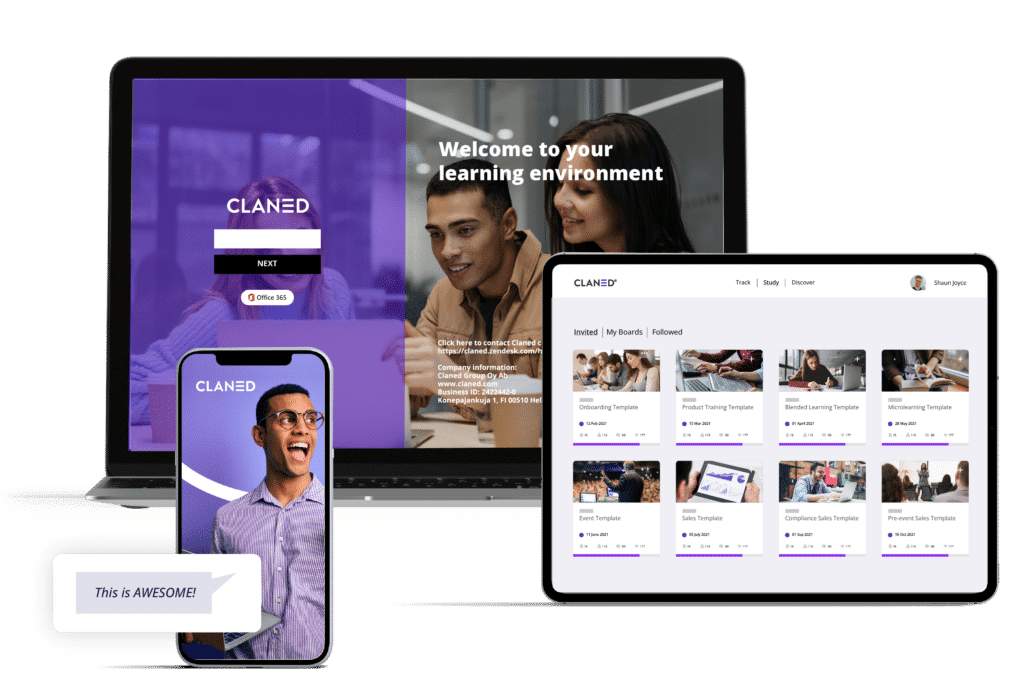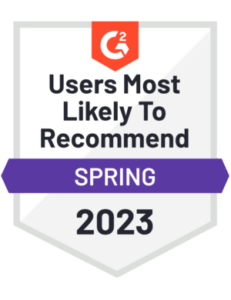Over the past couple weeks, we have used our blog to share our insights about the changes AI will bring to the landscapes of learning and education.
This week, we continue with the theme of AI’s impact on the landscape of learning but shift our focus from current and near-future changes we are already seeing or will likely see soon, and instead explore speculative futures or things we might one day witness.
As we peer into the horizon of AI’s potential in learning and education, we seek to explore imaginative scenarios where AI redefines how professionals train, learn, and collaborate, offering a glimpse into a future where personalized learning, immersive experiences, global collaboration, and blockchain-backed credentials shape the learning landscape.
So, activate your AR glasses and get ready to engage you’re your imagination as we explore the hinterlands where sci-fi and reality intersect.
Tailored Learning for Professional Growth
In the rapidly evolving landscape of professional training and continuous learning, AI emerges as a strategic partner for both learners and businesses. Personalized learning pathways, orchestrated by AI, offer a transformative approach.
For learners, this means a deeply individualized journey toward career goals. AI considers their unique aspirations, current skill set, and preferred learning styles, ensuring that each step aligns with their needs.
This not only enhances the effectiveness of learning but also keeps learners engaged and motivated.
Benefits for Professionals
Businesses reap significant advantages from this paradigm shift. First and foremost, a workforce equipped with precisely the skills needed for their roles boosts overall productivity and innovation.
AI’s real-time adaptability means that employees are always up to date with the latest industry trends and technologies, which is vital in today’s and tomorrow’s fast-paced markets. Moreover, the agility of AI-driven pathways allows businesses to respond swiftly to changing skill demands, reducing skill gaps and ensuring competitiveness.
Considerations and Limitations
There are considerations to keep in mind. One potential limitation lies in the quality of AI recommendations. Over-reliance on algorithms might result in missed opportunities for human interaction and mentorship, which can be invaluable in professional development.
Additionally, ensuring that the learning pathway considers ethical dimensions, and the responsible use of skills is a challenge AI system must address. Striking the right balance between personalization and maintaining a holistic, well-rounded skill set can also be a complex task.
In essence, AI-powered personalized learning pathways mark a significant step forward in the realm of professional training and continuous learning.
They offer unprecedented levels of customization, enabling learners to navigate their careers more effectively, while also providing businesses with a dynamic, adaptable workforce.
However, careful consideration and ongoing refinement of AI systems are crucial to maximize their benefits while mitigating potential limitations.
Virtual Reality (VR) Learning Environments: Immersive Skill Development
Imagine a future where professionals, from surgeons honing their skills to engineers troubleshooting complex machinery, step into immersive VR simulations guided by AI.
These environments offer hands-on learning experiences within a virtual, risk-free space. For medical practitioners, this could mean practicing intricate surgeries on AI-driven virtual patients.
Engineers might immerse themselves in the inner workings of machinery, diagnosing and fixing issues, all while AI acts as a knowledgeable guide. In fact, we are already starting to see signs of technology like this emerging, however the cost, accessibility, and level of detail, currently make it little more than a novelty.
However, as AI systems become more specialized and robust it is likely we will see more widespread adoption of this kind of virtual training.
Benefits for Professionals
Professionals benefit immensely from VR learning environments. They gain access to realistic, high-stakes scenarios without real-world consequences, allowing them to refine their skills and decision-making.
The immersive nature of VR enhances engagement, making learning enjoyable and memorable. AI plays a crucial role in these environments, providing real-time feedback, assessing performance, and customizing scenarios to match the professional’s skill level.
Business Advantages
For businesses, investing in VR learning can lead to a highly skilled and confident workforce. Reduced risks associated with real-world training translate into cost savings and a safer work environment. Additionally, AI analytics in VR environments offer valuable insights into employee performance and skill gaps, facilitating targeted skill development programs.
Considerations and Limitations
However, implementing VR learning at scale requires substantial resources, including specialized equipment and content development. Ensuring that VR environments are accessible and inclusive for all employees is also a concern. Moreover, the challenge lies in seamlessly integrating AI guidance into VR simulations to provide meaningful, context-aware assistance without overwhelming the learner.
Augmented Reality (AR) for On-the-Job Learning: Real-Time Skill Enhancement
AI-equipped AR glasses may become indispensable tools for professionals in various industries. These smart glasses provide real-time information, instructions, and troubleshooting guidance, enhancing on-the-job learning.
For example, field technicians might wear AR glasses that overlay equipment schematics onto real-world machinery, guiding them through complex maintenance tasks. AI, through these AR devices, becomes an ever-present assistant, offering relevant data and expertise.
Benefits for Professionals
Professionals wearing AR glasses experience a seamless blend of the physical and digital worlds. AI provides context-aware assistance, such as highlighting critical components or step-by-step instructions.
This real-time support enhances their ability to perform tasks efficiently and accurately. AR also facilitates continuous learning during work hours, reducing the need for separate training sessions.
Business Advantages
Businesses benefit from increased productivity and reduced errors as employees have instant access to relevant information. AR-enhanced workers can adapt to new tasks and technologies faster, leading to a more agile workforce.
AI-driven AR also provides valuable data on employee performance and areas where additional training may be necessary.
Considerations and Limitations
While AR offers significant advantages, privacy and data security must be carefully managed when using wearable technology in professional settings. Training employees to use AR effectively and ensuring the technology remains up-to-date are additional challenges. Companies must also consider the potential distractions AR might introduce in the workplace.
AI-Driven Global Collaboration: Expanding Horizons
In the future, AI could play a pivotal role in fostering global collaboration among professionals. Collaborative platforms will leverage AI for real-time language translation, culture-sensitive communication, and task optimization, creating an inclusive environment where diverse teams work seamlessly together on global projects.
Benefits for Professionals
Within business and professional settings, we already find ourselves working more and more internationally, in our increasingly connected world, AI may bring to being a truly global and inclusive collaborative experience.
Language differences will no longer be barriers, thanks to AI’s instant and accurate translation. Culture-sensitive communication tools will ensure that diverse perspectives are valued and understood. AI’s task optimization capabilities will streamline workflows, enhancing productivity and ensuring efficient teamwork.
Business Advantages
Businesses will gain access to a vast and diverse talent pool, allowing them to assemble cross-cultural and cross-disciplinary teams. This diversity will drive creativity and innovation.
Efficient task optimization will ensure that projects progress smoothly and on schedule. AI analytics will provide valuable insights into team dynamics, helping businesses refine their collaboration strategies.
Considerations and Limitations
Managing global collaboration with AI can be complex, requiring coordination across time zones, cultures, and industries. Protecting intellectual property, ensuring fair recognition for contributors, and addressing data security concerns are important challenges. AI project managers must balance task optimization with human creativity and autonomy.
The fusion of AI-driven collaboration tools and global collaborative projects represents a transformative vision for professionals and businesses alike. AI will help to break down language and cultural barriers while facilitating cross-disciplinary problem-solving on a global scale.
To realize this vision, addressing challenges related to data security, cultural sensitivity, and effective project management will be crucial.
Blockchain-Backed Skill Verification: A Paradigm Shift in Credentialing
In the future, AI could help to usher in a groundbreaking approach to skill verification through the utilization of blockchain technology. This innovation promises transparent, authentic, and revolutionize how skills and certifications are recognized, valued, and tracked.
Benefits for Professionals
Professionals will find their credentials to be more secure and portable. Blockchain technology ensures that once a skill or certification is verified and added to the blockchain, it becomes tamper-proof and universally accessible.
This eliminates the need for cumbersome paper or digital certificates or badges and provides a secure and verifiable record of their skills throughout their career.
Business Advantages
Businesses stand to gain a highly skilled and trustworthy workforce. They can easily verify the skills and qualifications of potential hires or contractors, reducing the risk of hiring unqualified individuals.
This ensures that their teams are well-equipped to meet the demands of their roles, enhancing overall productivity and quality of work.
Streamlined Hiring and Talent Management
Recruitment processes become more efficient, with blockchain-backed credentials allowing businesses to quickly verify the qualifications of candidates. HR departments can easily match skills to job requirements, making hiring decisions more accurate.
Moreover, ongoing talent management becomes more effective as businesses can proactively identify skill gaps and provide targeted training.
Continuous Learning and Skill Updates
Professionals will be encouraged to engage in continuous learning to keep their blockchain-backed credentials current.
AI systems could offer personalized recommendations for upskilling or reskilling based on changing industry trends. This results in a highly adaptive workforce that stays ahead in a rapidly evolving job market.
Considerations and Limitations
As with any emerging technology, there are challenges to address. Ensuring the accuracy of initial credential verification and protecting against fraudulent claims is crucial.
The accessibility of blockchain-verified credentials should be balanced with data privacy concerns, guaranteeing that individuals have control over who can access their information.
Nor should hiring decisions be made on credentials alone, people still need to work together and as part of teams, and the “fitness” of an individual for a particular role is likely to include social-emotional elements which are difficult to measure and certify, in addition to skills and knowledge.
Performance and team dynamics rely heavily on these sorts of “soft skills” and intrapersonal relationships, which cannot be overlooked in favour of simply a credentials record.
Final Thoughts: Navigating AI’s Uncharted Territories
From immersive VR learning environments that empower professionals to hone their skills in risk-free realms to AI-driven AR glasses providing real-time guidance in the workplace, the future of learning is poised to be both transformative and engaging.
Seamless communication and collaboration across language, cultures and locations offers a more diverse, inclusive approach to working together. A paradigm shift towards blockchain-backed skill verification promises a world where credentials are secure, transparent, and perpetually up-to-date, benefiting both individuals and businesses.
These speculative futures are not concepts for a sci-fi story (though they could be), they represent the potential of AI to reshape the future of learning and education.
However, even this journey into the speculative future applications must be undertaken with caution. It requires us to navigate not only the seemingly boundless opportunities but also the challenges and ethical considerations that accompany such profound transformations.
As we drive towards these uncharted territories it is important we keep in focus and address the issues of accessibility, integration, privacy, and the preservation of human mentorship, emotions, mental well-being, and ethical dimensions in education.
The speculative futures of AI and learning invite us to briefly depart reality, delve into imagination and envision a world where these to opposites meet; where learning is not confined to classrooms but extends into immersive digital realms, transcending geographical borders.
It challenges us to rethink how we verify and recognize skills and qualifications in a rapidly evolving professional landscape.
As we embrace these speculative horizons, we recognize that the future of learning and education is not set in stone but is an ever-evolving, dynamic landscape shaped by human ingenuity and AI’s transformative potential.
The journey continues, and the possibilities are limited only by our imagination and our commitment to responsible, ethical, and inclusive education in an AI-powered world.







